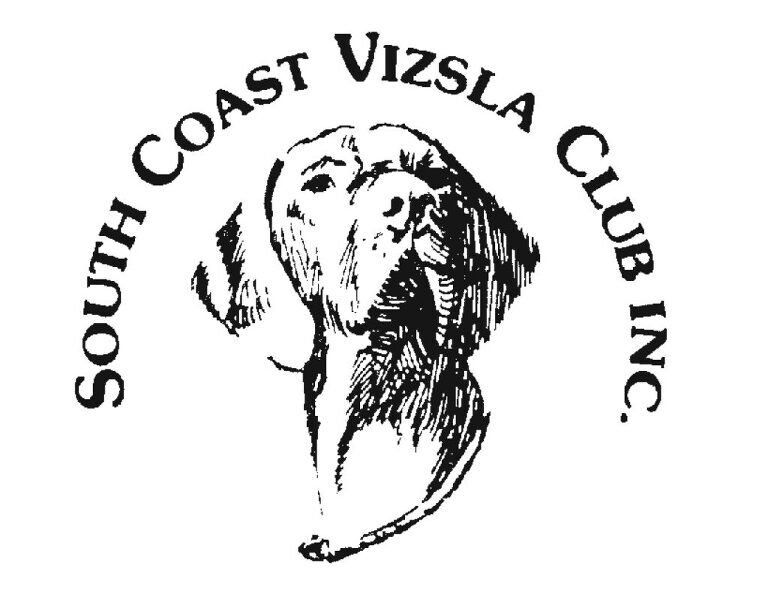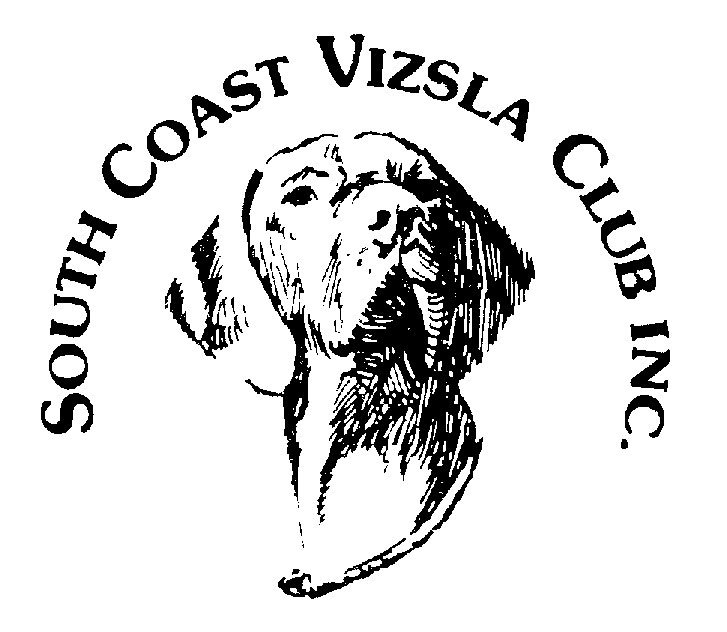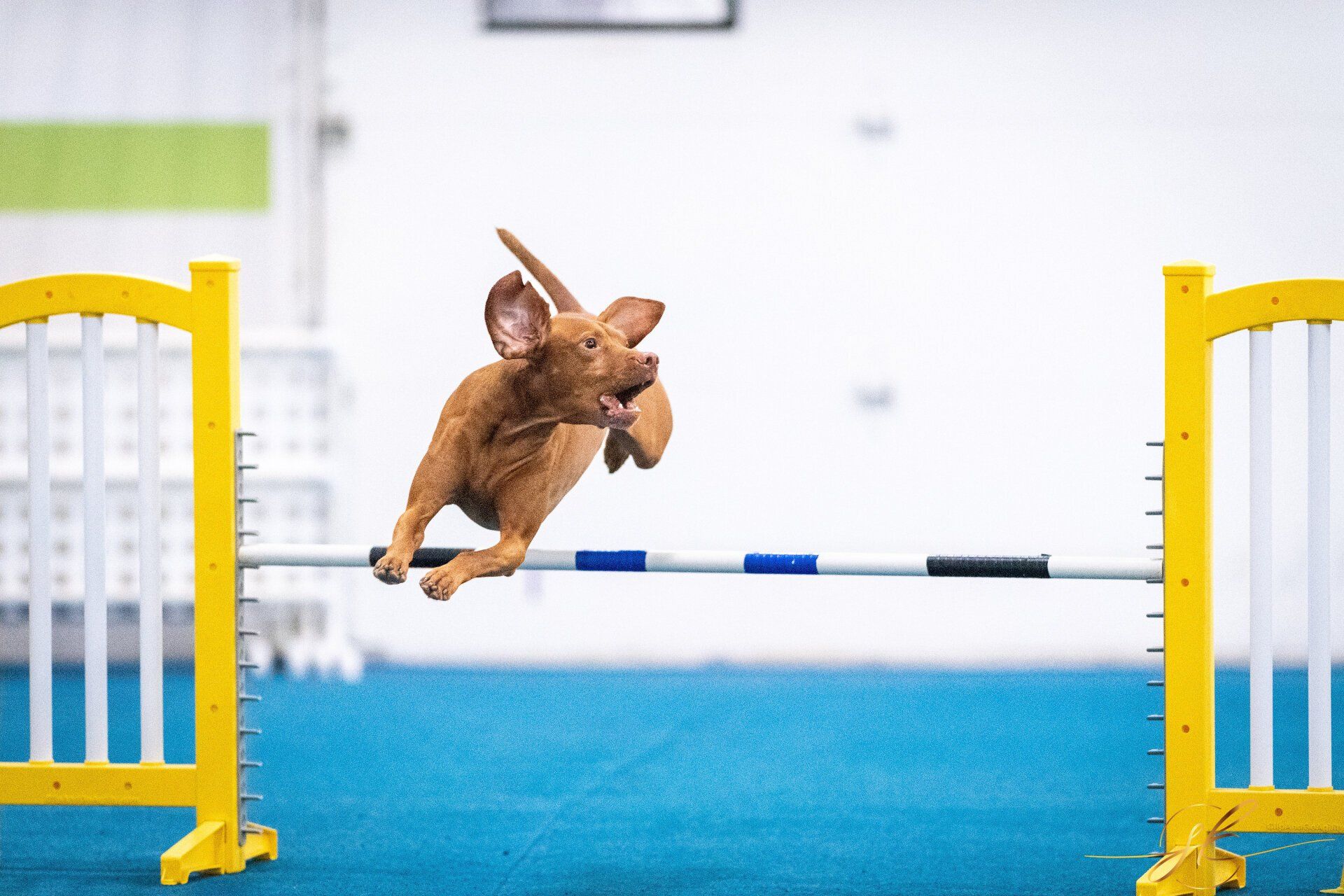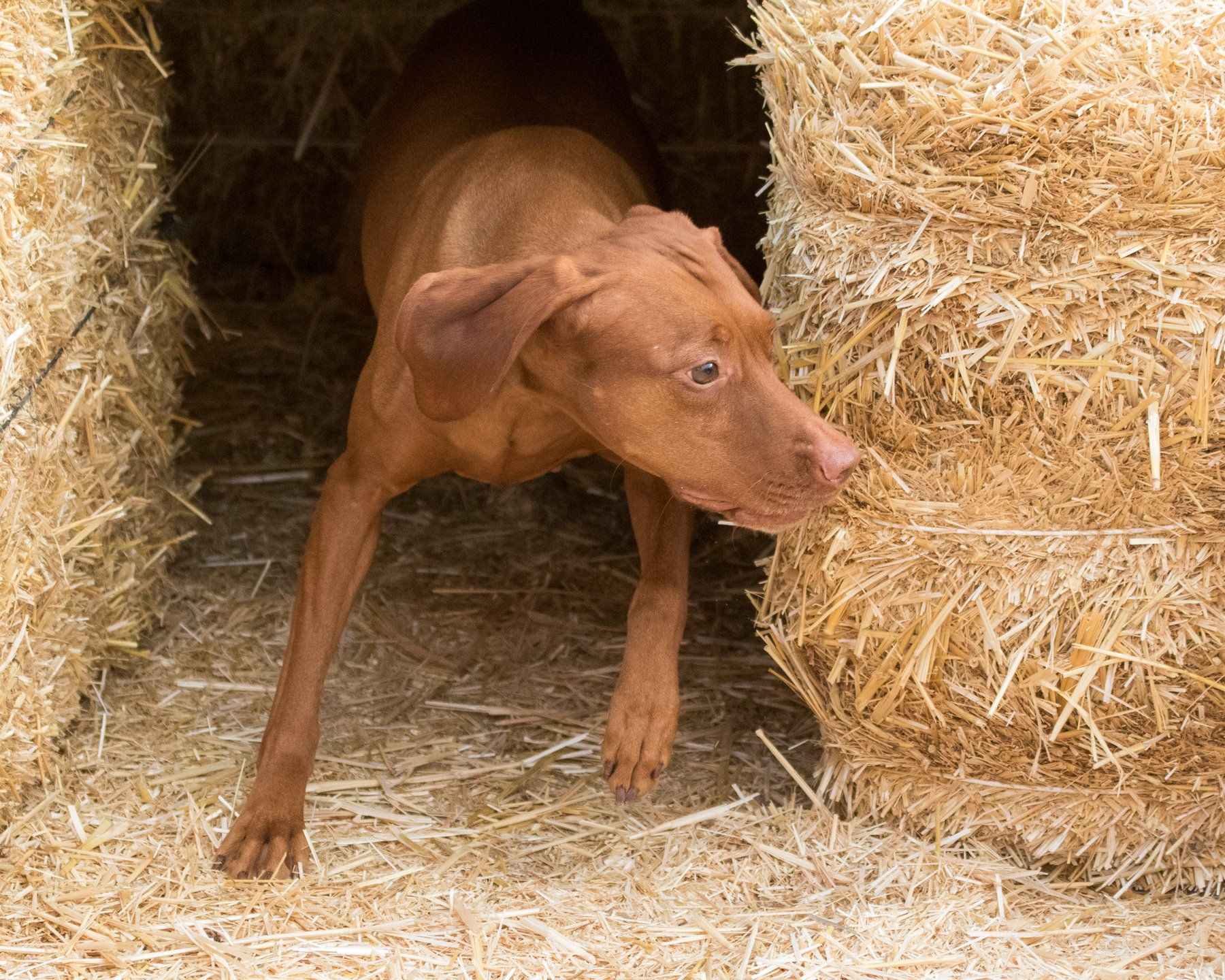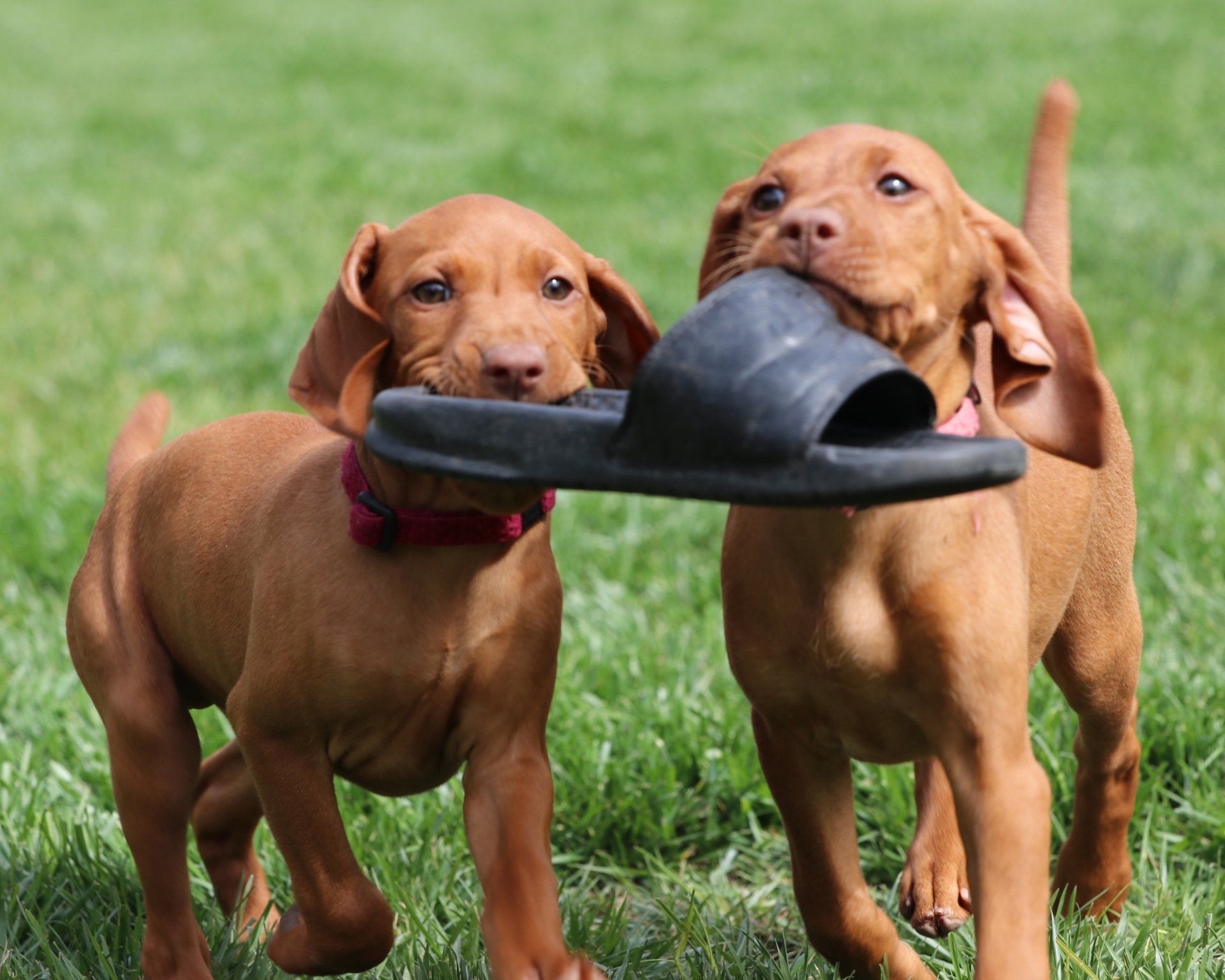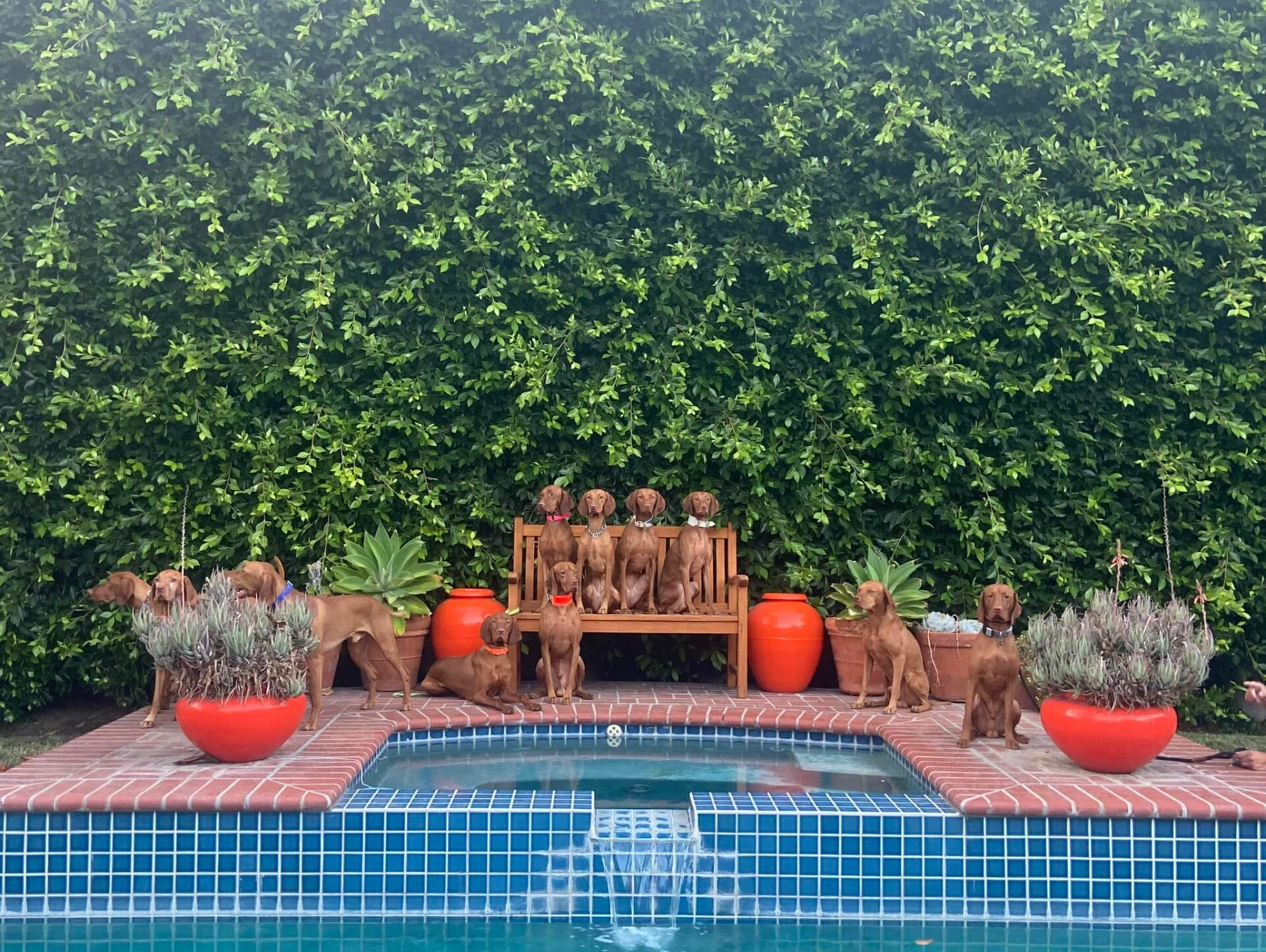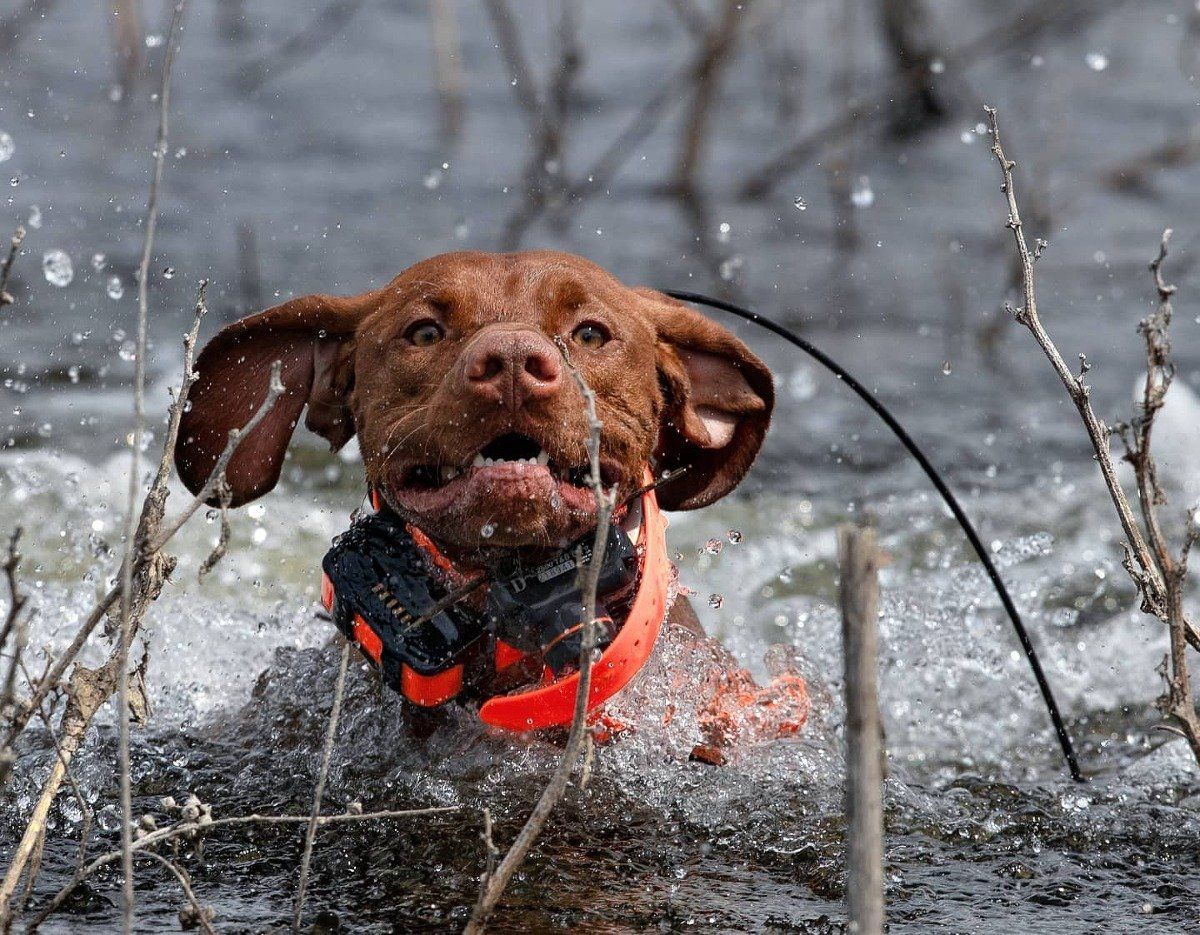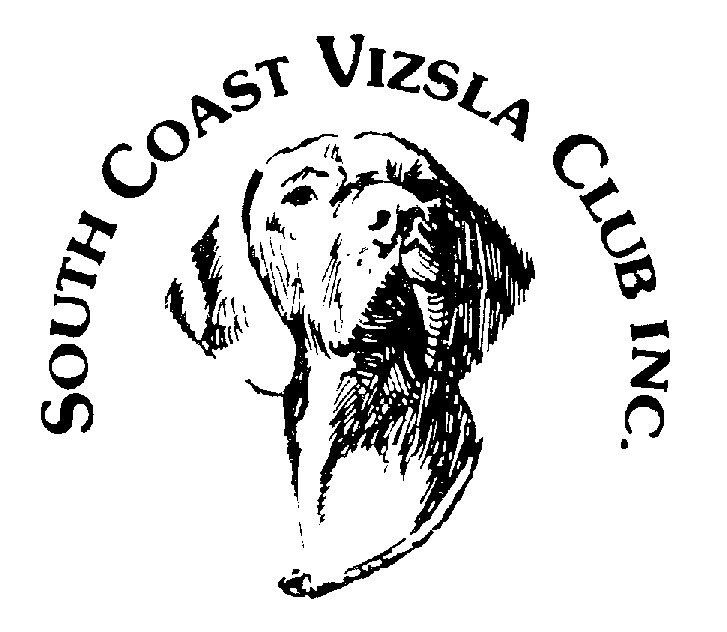Breeder Referral
Getting a Vizsla
Is a Vizsla the right breed for you?
VIZSLAS ARE HIGH-ENERGY DOGS. ARE YOU A HIGH-ENERGY FAMILY?
People who enjoy being out in nature and like walking, jogging, or running are good matches for this breed. Vizslas need many hours of off-leash running per week, which is often difficult to fit into the busy schedule. You’ll have to be not only willing but eager to spend at least 7 hours per week exercising your dog. If you’re a low-activity person or prefer an indoor gym over the fresh outdoors, a Vizsla is not for you. But if your family loves to spend lots of active time outdoors, this breed may be ideal for bringing out the best in you. One of our favorite things about Vizslas is that we can spend hours with them out in nature instead of using that time for dog grooming. As a short-haired sporting dog, the Vizsla has the advantage of being a ”drip-dry and go” dog who needs only the basic care common to all dogs (nails, teeth, ears, eyes, and the occasional bath).
VIZSLAS ARE STRONG AND ENTHUSIASTIC. ARE YOU STRONG AND PATIENT?
Vizslas are very strong dogs. They are all muscle and sinew, made to run all day long. They also love people and other dogs, meaning they’ll easily knock young children over. As a hunting dog, the Vizsla likes to retrieve and chase; if not well trained, the dog may nip children in play. They will pull on the leash when walking unless trained at a young age not to do so. Even the smallest female Vizsla can pull you right off your feet. This can be very frustrating, and first-time dog owners, in particular, may lose patience at this stage. Ideally, no member of your family is under 12 years old so that all of you can handle the dog and not get knocked or pulled over. Their strength also means that Vizslas are not fragile; they can excel in some very active sports, such as Agility. If you’re seeking a sporting companion who can keep up with you, this may be the right breed for you.
VIZSLAS ARE NEEDY, PERSISTENT, AND SENSITIVE. ARE YOU TOLERANT, POSITIVE, AND CONSISTENT?
Vizslas have been nicknamed “the Velcro dog” because of their need to be stuck to your side all the time. They want to be on your lap, with you on the sofa, and generally in your face. Many people find this behavior annoying and would prefer a more-independent dog willing to hang out on their own. But Vizslas don’t hang out on their own—ever. They’re also very sensitive and require positive, consistent training and caregiving. If you use harsh techniques, they may shut down or resist, even refuse to work for you. A sensitive dog can be a challenge to train, even for people who’ve had experience with other breeds. They’re not like a Golden, a Labrador Retriever, or a Shetland Sheepdog, always willing to work for you. Vizslas are highly intelligent and are easily bored. They need an enthusiastic trainer who can remain calm, positive, and inventive no matter what. Each person in the family must be willing and able to follow a very positive and consistent dog-training routine. Reputable breeders will not sell a dog to a home that will not use positive training techniques. If you have a positive attitude toward life in general, and your dog in particular, and you’re willing to be flexible and creative in your training, this breed may suit you very well.
VIZSLAS ARE THINKERS. CAN YOU OUT-THINK THEM?
Vizslas love problem-solving. Unless you provide outlets for them to figure things out, they’ll invent their own games and behaviors that often involve finding edible or chewable objects, no matter how well hidden; or they’ll learn to open doors and cupboards. The best Vizsla owners provide jobs for their dogs to keep them happy, such as competitive Obedience, Agility, or Field Tests. These activities are best considered fun, long-term pursuits. The idea is that obedience or other training is its own reward and should not end after your dog has mastered basic manners or earned that first title. Vizslas need an ongoing occupation that allows them to learn and grow with you. As stewards of the breed, reputable breeders are acquiring and breeding Vizslas to improve the breed; therefore, they participate with our dogs in shows such as Conformation, Field Trials, Agility, and Obedience. Reputable breeders prefer to place their puppies with loving families willing to provide an active lifestyle for the dog. If you’re seeking a performance dog, the Vizsla is an ideal partner. Because of their need to explore, Vizslas should not be left unsupervised at any age. They should be crated in their den (a kennel or crate) while you’re away from home or not paying attention to them. Proper crate-training protects a dog from potentially life-threatening situations in the home and also makes for a happier dog who is less likely to have separation anxiety and home-protection issues.
Take the "Vizsla Test"
I understand my Vizsla will need plenty of off-leash exercise well into their adulthood and will make the commitment to provide this necessity.
- Yes/No
Will I be able to commit to the necessary amount of socialization for my puppy, which should be 100 dogs and 100 people within the first 18 weeks of age
- Yes/No
Will I be able to provide daily supervision and not leave the dog alone for extended periods of time?
- Yes/No
Do I understand that Vizslas are inside-the-home dogs and not kennel dogs left outside?
- Yes/No
Did you answer "Yes" to all of the above? Great! The Vizsla just might be the right breed for you!
Responsible Vizsla breeders will do the following:
- Adhere to the Vizsla Club of America (VCA) Code of Ethics.
- Test and ensure Vizsla breeding stock is cleared of hip dysplasia after two years of age before mating and received an OFA Certificate (with numbers) from the Orthopedic Foundation of Animals (OFA).
- Follow the breed-specific recommendations for health testing by the Canine Health Information Center (CHIC) for Vizslas. CHIC Certifications (with numbers) are issued to Vizslas tested for hip dysplasia (OFA), thyroid function, and eye health (CERF). Optional testing includes sebaceous adenitis, von Willebrand disease, congenital cardiac disease, and elbow dysplasia. These health records may also be found on the OFA website. Many breeders will also use the PennHIP evaluation to test for hip dysplasia. PennHIP results are included on the OFA website for each dog who has been tested.
- Strive to breed according to the AKC Breed Standard for the Vizsla, which was drafted and approved by the Vizsla Club of America.
- Know the pedigrees of their own dogs well and share them with prospective buyers along with the health and temperament records of each dog going back five generations.
- Search pedigrees to explain why a particular breeding can improve upon the dam’s and sire’s characteristics.
- Introduce prospective buyers to their new Vizsla family, and show them where a litter is being whelped and raised.
- Provide a written agreement for review prior to a sale.
- Provide AKC registration papers, a signed written agreement, and a veterinary health certificate upon a sale.
- Provide support to puppy buyers for the life of the dog.
Source: VCA Website
